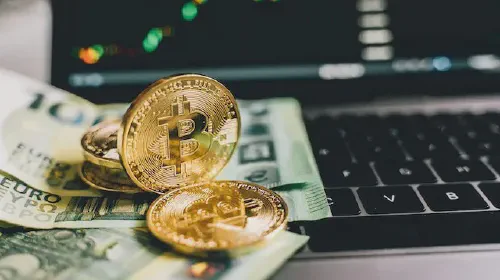The Future of Forex Trading with Blockchain Adoption | Impact & Benefits
Salomon Kisters
Feb 9, 2023This post may contain affiliate links. If you use these links to buy something we may earn a commission. Thanks!
The future of forex trading is rapidly evolving and shaped by various factors, including technological advancements and changes in market dynamics.
One technology that is set to revolutionize forex trading is blockchain, which has the potential to transform how foreign exchange trades are conducted. In terms of widespread adoption, blockchain technology has few competitors. As a result, blockchain pilot programs are underway in every major sector, from banking and finance to shipping and transportation.
More than $6.6 billion is exchanged daily in the FX market, making it one of the largest markets in the world. Amazingly, traders in this market may choose from more than 170 different currencies worldwide, with many brokers offering trading access through platforms such as TradingView and MetaTrader 4.
This article explores the impact that blockchain adoption is set to have on the forex trading industry and what the future holds for forex traders.
What is Blockchain?
Blockchain is a secure network that runs on top of the internet that serves as a public or distributed ledger of data that may be used to create social networks, messaging apps, games, exchanges, storage platforms, etc.
The information stored in a blockchain may be in almost any format, which explains its adaptability. The blockchain network needs numerous nodes or devices to authenticate a transaction before it can be recorded. Once these nodes have agreed to keep anything, it cannot be challenged, erased, or updated without the consent of the original creator of the record and the whole blockchain network.
Blockchain operates on a distributed ledger that keeps multiple copies of data on various nodes and nodes’ devices (such as computers and printers) in the network.
How Blockchain adoption can improve FX trading
The decentralized nature of blockchain technology can enable innovations in forex trading, such as decentralized exchanges and peer-to-peer trading.
Speeding up Transactions and Cutting Down on Trading Fees
There is no question that blockchain’s distributed ledger technology can further lower online transaction times. Additionally, it may lower the charges for foreign currency transactions that brokers and central banks impose at the point of exchange.
This is because blockchain is a decentralized technology that eliminates the need for a trusted third party or centralized authority and may eventually render today’s brokerage platforms obsolete. Blockchain uses several protocols and consensus techniques to pick network validators and optimize transaction speeds so that no centralized authority may charge to execute transactions.
Blockchain technology has been adopted by various industries, including banking and finance, to lower the costs of international transactions and reward loyal customers. Future implementations of blockchain technology in the foreign exchange market could facilitate its transition to a decentralized peer-to-peer platform, where large-scale transactions are executed by a larger number of participants in the financial market, allowing you to take advantage of the lowest possible transaction costs and maximize your profits.
Integrating Transparency into the Foreign Exchange Market
One of the key ways blockchain technology may aid in developing the foreign exchange market is by creating more transparent and immutable records of individual transactions.
After a transaction has been completed, blockchain and distributed ledgers cannot be manipulated by anybody, and every single transaction is accounted for and documented publicly.
The benefits of blockchain go beyond simple transactions; for example, it may be used to build a better and more transparent regulatory environment for traders by securing currency quotations, regulations, and currency quotes in an immutable ledger.
Taking this concept further, blockchain will allow the FX market to gradually develop its decentralized database, thereby eliminating the possibility of fraud and making it much simpler to spot instances of market manipulation.
Strengthening Security for Market Participants
Using universal forex money management strategies can help you deal with the very liquid nature of the market by encouraging you to manage leverage properly and never take positions equal to more than you can afford to lose.
While this strategy has numerous advantages for investors, it also has several flaws since it often permits large amounts of money to be moved without altering asset values.
It’s susceptible to cybercrime, human mistake, and trading account manipulation, offering serious security issues and providing clear chances for rogue traders or hackers masquerading as online investors. However, the blockchain’s core technology helps mitigate these risks by hashing encryption before transmitting any sensitive transaction data. This is made up of data chunks tied together irrevocably by their hash values.
This results in an intrinsically secure system that is almost impossible to attack and can be layered atop the normal 128-bit SSL encryption used in the trading community. It’s important to remember that blockchain also enables anonymous transactions, meaning that private or sensitive information like your main email address or name is not tied to specific purchases.
Use of smart contracts in forex trading
The use of smart contracts in forex trading is another area where blockchain has the potential to make a significant impact. Smart contracts are self-executing agreements with the terms of the agreement directly written into the contract’s code.
This eliminates the need for intermediaries and ensures that all parties can trust the execution of the contract. In the forex market, smart contracts can automate the execution of trades, reducing the risk of fraud and increasing the speed of transactions. This is because smart contracts are transparent and secure, ensuring that all participants have equal access to information and can trust the execution of trad
Stay informed with the latest insights in Crypto, Blockchain, and Cyber-Security! Subscribe to our newsletter now to receive exclusive updates, expert analyses, and current developments directly to your inbox. Don't miss the opportunity to expand your knowledge and stay up-to-date.
Love what you're reading? Subscribe for top stories in Crypto, Blockchain, and Cyber-Security. Stay informed with exclusive updates.
Please note that the Content may have been generated with the Help of AI. The editorial content of OriginStamp AG does not constitute a recommendation for investment or purchase advice. In principle, an investment can also lead to a total loss. Therefore, please seek advice before making an investment decision.

Understanding the Special Features of Bitcoin: Limited Supply, Decentralized Transactions, Security, and Global Accessibility
Explore the unique features of Bitcoin, including limited supply, decentralized transactions, security, and global accessibility. Learn why Bitcoin is a groundbreaking digital asset.

Here Is Why Bitcoin Transactions Take So Long
Why do Bitcoin transactions take so long? Here are the reasons and methods to speed them up.

Top 10 Countries Leading in Crypto and Bitcoin Adoption - Find Out Now!
Discover the top 10 countries leading in crypto and Bitcoin adoption, from the United States to Switzerland. See who's at the forefront of digital currency!
Protect your documents
Your gateway to unforgeable data. Imprint the authenticity of your information with our blockchain timestamp